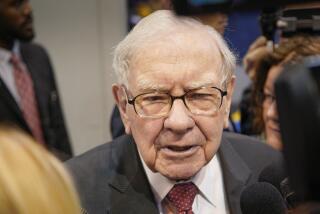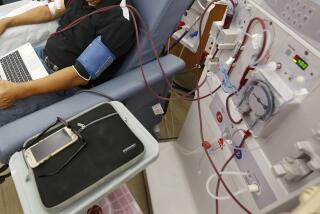The Greatest Gift
- Share via
Generosity is a word used so often it tends to lose the glow of its high moral definition. To me it means someone who gives without any thought of recognition, and no one exemplifies that better than a man called Max.
In a town filled with attention-seekers, the existence of someone like Max, a onetime homeless guy, is an anomaly. He donated a kidney to the benefactor who got him off the street and still asks nothing in return. He doesn’t even want to be identified.
I heard about him from the organ recipient, a retired aerospace worker named Loyal Harris, a tall, robust man of 80 who can’t keep the tears from his eyes when he talks about his gratitude toward Max.
“Let me tell you,” he said to me one day over coffee, his voice choking, “there’s nothing closer than two people who share the same kidney. It’s hard, very hard, to even explain. He gave me back my life.”
Harris was a merchant seaman during the Second World War and it shows in his bearing. His white hair is the foam of the ocean and his brilliant blue eyes the color of the sea. He has a sailor’s look if there ever was one.
Harris met Max 20 years ago at a Winchell’s Donut Shop in the Valley. Homeless and hungry, Max was a skinny kid in his 20s who swept up the place for the doughnut ends they’d give him to eat.
Watching him over a period of days, Harris decided no one ought to live like that and offered Max his hand.
*
No one needed a friend more than the kid who lived off crumbs and slept in an abandoned car. Harris asked Max over to his table, fed him, listened to his story and invited him to live in a motor home on his property.
“I was a little worried about it,” Harris says, “but I could tell he was in bad need, so I took a chance. I could see goodness in him.”
Harris got Max some new clothes, gave him starter money and took him around the Valley until he got him a job. There were never a lot of thank-yous from the homeless man Harris had befriended, but gratitude was obviously growing.
During their years of friendship, Harris heard a story of survival from Max that was as raw as any he could remember. The old sailor himself is no stranger to surviving. Wartime duty on an oil tanker in three major theaters of war brought him about as close to death as anyone ought to be.
Max’s survival was different. He told Harris a story of childhood abandonment by a prostitute mother, of running away from a foster father who beat him, of living like an animal in the Northwest woods, and of finally wandering the country in constant need.
But now, through Harris’ magnanimity, he had a chance to live like a human being and was proving himself an able and intelligent worker.
If the thought of paying Harris back ever entered his head, Max said nothing. But the opportunity came four years ago.
*
In his youth, Harris had worked around cyanide in the gold mines of Wyoming. Unknown to him, the poison had invaded his body, and his kidneys had been irreparably damaged. A routine test showed they were failing fast.
Harris was put on dialysis for a year, but it wasn’t working. “I was falling apart in a hurry,” he says, recalling the agony. “I wouldn’t have lived.”
By now, Max was working steadily and had his own apartment. Such was his intelligence, Harris says, that, given simple instructions, he had learned how to build his own computer.
Unaware of Harris’ predicament at first, Max heard about it from his friend’s sister. Told his benefactor needed a kidney transplant to live, Max hesitated not a moment. “I’ll give him one of mine,” he said.
After months of tests, it was determined that the donation was possible. Surgery was performed four years ago at St. Vincent Medical Center by Dr. Robert Mendez.
“His kidney is right here,” Harris said to me that day over coffee, tapping his lower right abdomen. “I didn’t ask him for it. I wouldn’t have. It was all his idea. I owe him everything.”
When I tried talking to Max about it, he refused. His was the ultimate gesture of giving. In a world that feeds on notoriety, he asked for nothing.
Both men, each in his own way, gave the other a gift of life that is beyond nobility, and while I honor Max’s desire for anonymity--Max isn’t his real name--I would be remiss in letting the story die untold.
It was the ultimate generosity. I use the term without hesitation.
*
Al Martinez’s column appears Tuesdays and Thursdays. He can be reached online at al.martinez@latimes.com.
More to Read
Sign up for Essential California
The most important California stories and recommendations in your inbox every morning.
You may occasionally receive promotional content from the Los Angeles Times.













